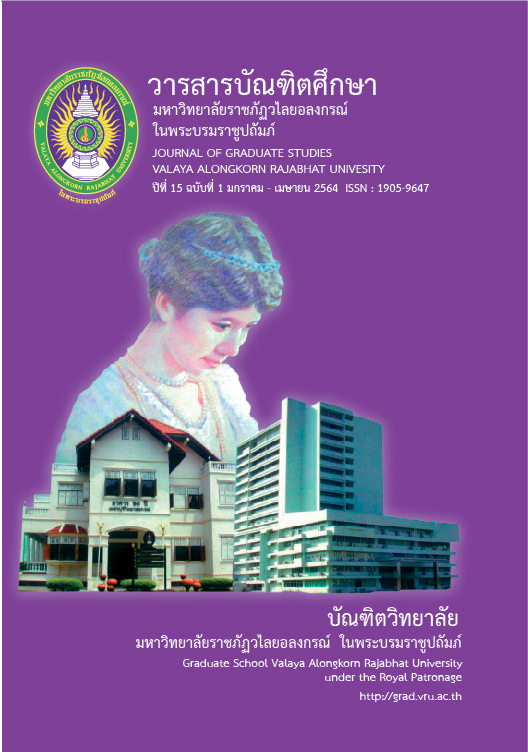THE EFFECTS OF ACTIVE LEARNING USING PROJECT-BASED FOR LARGE CLASSROOM IN INTERNATIONALIZATION FOR LIVING IN THE ASEAN AND GLOBAL COMMUNITIES COURSE
Main Article Content
Abstract
The purposes of this research were to 1) study the students’ analysing skill after learned through active learning using project-based compared with the criteria of 75 percent, 2) assess student group work behavior after learning with active learning using project-based and 3) study the students’ satisfaction towards active learning using project-based. The sample was 85 undergraduate students at Valaya Alongkorn Rajabhat University under the Royal Patronage, who enrolled in internationalization for living in the Asean and global communities’ course in the second semester of the academic year 2018, selected from cluster sampling. The research tools included 1) project-based learning activity plans 2) an analysing skill test 3) a group work behavior questionnaire and 4) a questionnaire on satisfaction. The statistics used included percentage, average, standard deviation and t-test for one sample.
The results indicated as follows: 1) the analysing skill of students after learned through the developed learning activity plans had an average score of 79.69 %, which was higher than the specified criterion of 75 % at a significant level (p<.05). 2) The group work behavior level of the students was very good ( = 4.49) with a standard deviation of 0.49. 3) The satisfaction level of the students was high (
= 4.42) with a standard deviation of 0.59.
Article Details

This work is licensed under a Creative Commons Attribution-NonCommercial-NoDerivatives 4.0 International License.
บทความทุกเรื่องได้รับการตรวจความถูกต้องทางวิชาการโดยผู้ทรงคุณวุฒิ ทรรศนะและข้อคิดเห็นในบทความ Journal of Global of Perspectives in Humanities and Social Sciences (J-GPHSS) มิใช่เป็นทรรศนะและความคิดของผู้จัดทำจึงมิใช่ความรับผิดชอบของบัณฑิตวิทยาลัย มหาวิทยาลัยราชภัฏวไลยอลงกรณ์ ในพระบรมราชูปถัมภ์ กองบรรณาธิการไม่สงวนสิทธิ์การคัดลอก แต่ให้อ้างอิงแหล่งที่มา
References
Ampanon, K. (2017). kānphatthanā rūpbǣp kān rīanrū chœ̄ng ruk thī songsœ̄m thaksa kān khit wichā khwāmpen khrū samrap naksưksā Khana Kharusāt mahāwitthayālai rātchaphat phet būn. [A Development of an Active Learning Model that Promotes Thinking Skills in a Professional Teachers Course Managing for Students of the Faculty of Education of Phetchabun Rajabhat University]. Phetchabun Rajabhat Journal. 20(2), 87-100.
Chirarungsiman, S. (2006). khwāmrū kīeokap ʻongkō̜n khrư̄akhāi.[Knowledge of network organization]. Bangkok: Department Promotion and coordinate the participation of network organizations National Economic and Social Advisory Council, NESAC.
ChaiKitcharoenpinyo, S. (2005). sō̜n yāngrai hai Active learning [How to Active learning.] Journal of Learning Innovations. 2(2), 12-15.
Hongsakun, W. (2018). kānčhatkān rīanrū chœ̄ng ruk nai yuk thailǣn sī . 0.[Active learning management in Thailand 4.0] . Graduate School Conference 2018. Suan Samantha Rajabhat University, November 30th, 2018 p.479
Khammani, T. (2012). sāt kānsō̜n : ʻongkhwāmrū phư̄a kānčhat krabūankān rīanrū thī mī prasitthiphāp . [Pedagogy: Knowledge to the Effective Learning Process]. The 1st. Bangkok: Chulalongkorn University.
Koocharoenpisal, N. (2017). kānčhat kitčhakam kān rīanrū dōi chai khrōngkān pen thān phư̄a phatthanā khwāmsāmāt nai kān thotlō̜ng thāng witthayāsāt khō̜ng nisit parinyā trī chan pī thī nưng. [Using Project-based Learning Activity on Enhance the Abilityin Science Experiments of the First-Year Undergraduate Students]. Suranaree J. Soc. Sci. 11(1), 61.
Machchima, P., & Phiwma, N. (2017). kān rīanrū chœ̄ng ruk nai hō̜ng rīan khanāt yai dūai kānčhatkān rīan kānsō̜n bǣp hō̜ng rīan klap dān. [Active Learning in Large Classrooms through the Flipped Classroom Model]. Journal of Vocational and Technical Education (JVTE) 7(13), 59-60.
Phonyothin, P. (2008). rūam nawattakam tritsatī kānsưksā pathommawai sū kānprayukchai nai hō̜ng rīan . [Innovative early childhood education theory to apply in the classroom]. Sukhothai Thammathirat University Plan Sara.
Phonsima, D. (1999). kānphatthanā wichāchīp khrū : saphāp patčhuban læ panhā wichāchīp khrū nai prathēt Thai . [The development Teacher : Current Conditions and Problems of Teaching Profession in Thailand]. Veridian E-Journal. 2(4), 9-14.
Saiyos, L. and Saiyos, A. (1997). sathiti witthayā thāngkān wičhai [Statistical Sciences Research]. The 3rd. Bangkok: Suweeriyasan.
Srichantha, S. (2017). kānčhatkān rīanrū dōi chai khrōngkān pen thān phư̄a phatthanā phon samrit thāngkān rīan nai wichākān čhatkān rīanrū wichā khanittasāt nưng khō̜ng naksưksā sākhā wichā khanittasāt Khana Kharusāt mahāwitthayālai rātchaphat lœ̄i. [Project based learning in instructional methodology and management in mathematics 1 course for bachelor’s degree students of the faculty of education in mathematics at loei Rajabhat University]. Journal of MCU Social Science. 6(1), 127-138.
Sutiarj K., et al. (2018).kānphatthanā rūpbǣp kān rīan kānsō̜n bǣp nēn prasopkān tām saphāp čhing phư̄a songsœ̄m khunnalaksana kān rīan dūai kānnam tonʻēng khō̜ng nakrīan chan matthayommasưksā tō̜n ton. [The development of Instructional Model Based on authentic experiences to enhance self-directed learning characteristics of lower secondary students]. Journal of Graduate Studies Valaya Alongkorn Rajabhat University. 12(3), 1-13.
Thummakul D., et al. (2014). sưksā ngānwičhai rư̄ang phon khō̜ng kānčhatkān rīan bǣp khrōngkān tō̜ phatthanā phonkān rīanrū khō̜ng naksưksā. [Effects of project-based learning on learning development of nursing students]. Journal of health science research. 8(1),46.
Wasuwat, J. (1997). kānphatthanā prōkrǣm kān songsœ̄m čhariyatham thāng sangkhom khō̜ng dek wai ʻanubān tām nǣokhit khō̜n satrakti wit dōi chai kānčhat prasopkānbǣp khrōngkān. [A development of a program enhancing the constructivist-based sociomoral of preschoolers using the project approach]. Master's thesis. Chulalongkorn University.
Wisalaporn, W. (1997). kānwičhai thāngkān sưksā : lakkān læ nǣothāng kān patibat [Educational research: The principle and guidelines for Practice]. 1st, Bangkok: TonohGrammy.


